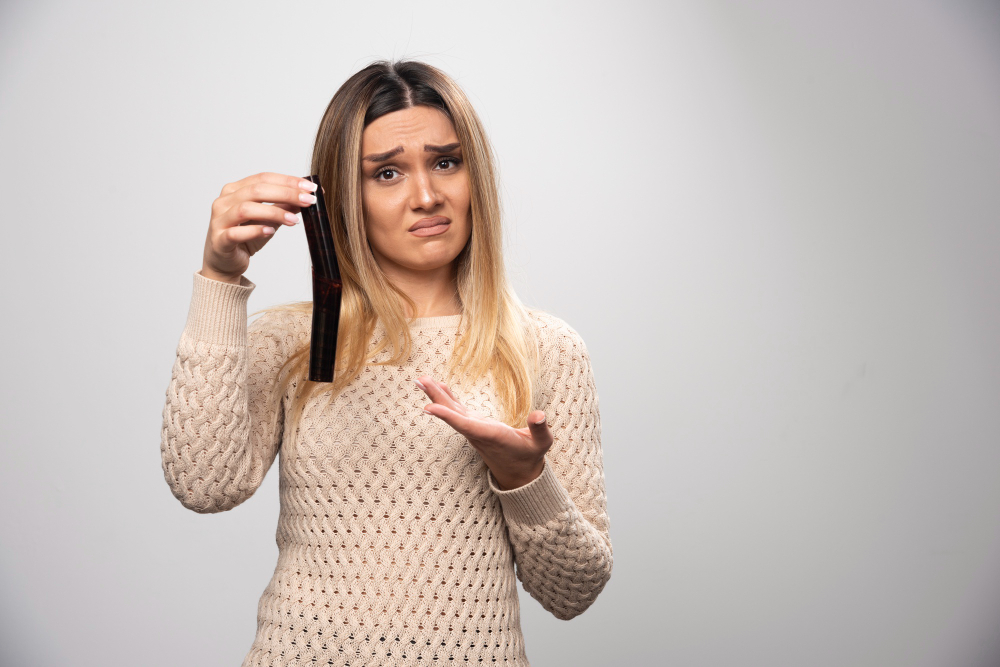Hair loss in women is a complex and often distressing condition. It can be influenced by multiple factors including genetics, hormones, nutrition, stress, and medication use. Among the medications most frequently linked to hair changes are oral contraceptive pills (OCPs). Millions of women in the UK take the pill, whether for contraception, polycystic ovarian syndrome (PCOS), acne treatment, or to regulate menstrual cycles. Understanding how OCPs can impact hair growth, and what this means for advanced treatments such as platelet-rich plasma (PRP), is crucial for women seeking long-term solutions.
Oral Contraceptives and Hair Loss: The Role of Androgenicity
Not all contraceptives have the same effect on hair. The impact depends on whether the pill contains a progestogen (progestin) with androgenic or anti-androgenic activity.
- Androgenic progestins are derived from testosterone and may worsen hair loss in women predisposed to female pattern hair loss by accelerating follicle miniaturisation.
- Anti-androgenic progestins reduce androgen activity and can protect against hair loss, sometimes even stabilising thinning in women with PCOS or hormonal imbalance.
- Sudden starting or stopping of any contraceptive can also trigger temporary shedding (telogen effluvium) due to abrupt hormonal change.
Common UK Oral Contraceptives and Their Hair Impact
More Androgenic (Higher Risk of Hair Shedding):
- Microgynon 30, Ovranette, Rigevidon (contain levonorgestrel)
- Noriday (contains norethisterone)
Low/Neutral Androgenic Activity (Generally Safer for Hair):
- Marvelon, Mercilon (contain desogestrel)
- Yasmin, Eloine (contain drospirenone, an anti-androgenic progestogen)
- Dianette (contains cyproterone acetate, strongly anti-androgenic, though usually prescribed for acne/PCOS rather than routine contraception due to clot risk)
This categorisation is especially relevant for women with a family history of hair thinning, PCOS, or known androgen sensitivity. Choosing a pill with lower androgenic activity may help prevent worsening of hair loss.
PRP Therapy and Oral Contraceptives: What We Know
PRP therapy involves concentrating platelets from a patient’s own blood and injecting them into the scalp. These platelets release growth factors that stimulate follicle repair, encourage new blood vessel formation, and help extend the growth (anagen) phase of the hair cycle.
Current evidence shows that oral contraceptives do not block or reduce the effectiveness of PRP treatments. However, their effect on hair density may indirectly influence how quickly results are visible. For example, women on androgenic pills may experience ongoing shedding which slows the impact of PRP, while those on anti-androgenic pills may see a stronger synergistic response.
Clinical studies and systematic reviews confirm that combined approaches are most effective. Women who use PRP alongside hormone regulation (via anti-androgenic OCPs or medications like spironolactone) achieve more consistent and sustained improvements compared to PRP alone.
Reflections from Rejuvence Clinic
At Rejuvence Clinic, we regularly see women presenting with hair loss either linked to the use of oral contraceptives or triggered by hormonal changes after stopping them. During a 45-minute consultation, our hair specialist Dr Ghani always takes a detailed medical history to establish which contraceptive a patient is using and whether it could be contributing to hair thinning.
From our experience, some patients have reported significant shedding after starting or switching contraceptives containing more androgenic progestins such as Microgynon or Noriday. Others, particularly women with PCOS, have stabilised their hair density when prescribed Yasmin or Dianette, thanks to their anti-androgenic activity.
When contraceptives appear to be influencing hair loss, we recommend a layered treatment plan. This may involve reviewing the choice of contraceptive, adding topical minoxidil, and in some cases prescribing spironolactone as an additional anti-androgenic agent. Alongside these measures, we incorporate advanced PRP treatments using Magellan TruPRP (level 2) or Angel Arthrex (level 3) systems, both of which deliver highly concentrated platelets for maximum follicular stimulation.
To support scalp health further, we also advise nutritional supplementation. At Rejuvence, we recommend Replenology, a supplement shown in systematic reviews to improve hair density over three and six months. Its effects compare favourably with other well-known brands like Nutrafol and Viviscal, and importantly, it demonstrates sustained benefits without the risk of “treatment resistance” sometimes seen with minoxidil or finasteride.
Final Thoughts
Oral contraceptives can either help or hinder hair health depending on the formulation. While some pills may worsen shedding due to androgenic effects, others can protect against hair thinning, especially in women with hormonal imbalances. These medications do not interfere with PRP directly, but they can shape the context in which PRP works and therefore influence outcomes.
At Rejuvence Clinic, we believe in a personalised and strategic approach. By considering contraceptive choice alongside PRP, exosome therapy, and medical or nutritional support, we help women protect and restore their hair with a plan tailored to their individual needs.
If you are worried about hair loss and currently taking an oral contraceptive, we encourage you to book a consultation with Rejuvence Clinic. Together, we can review your options and design a comprehensive, long-term strategy for healthy and confident hair.
📚 Key Reference
Lortkipanidze, N., Ovcharenko, Y., Khobzei, K. (2025). Androgenetic alopecia. In Psychosocial Aspects of Hair Disorders (pp. 133–150). Springer.

